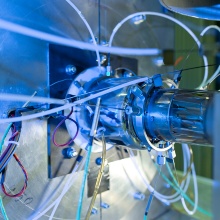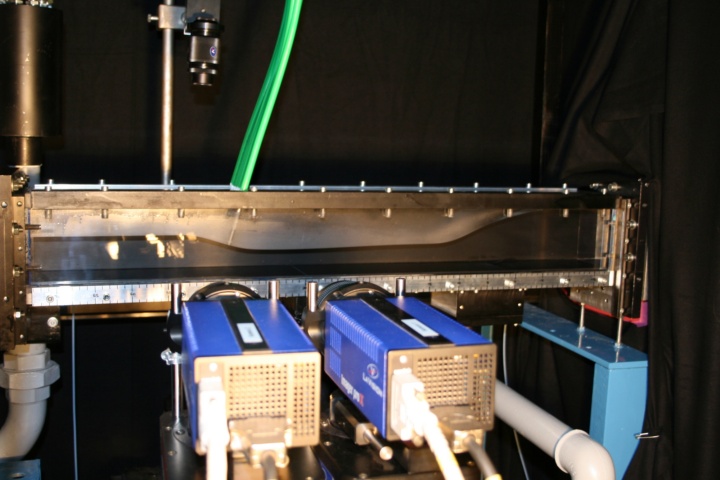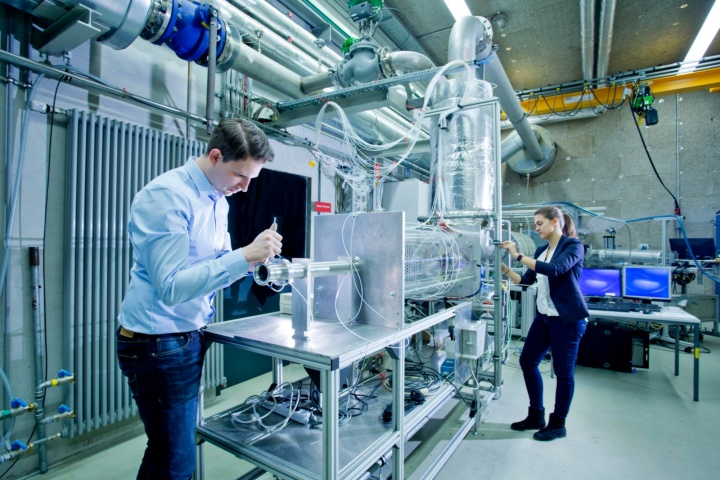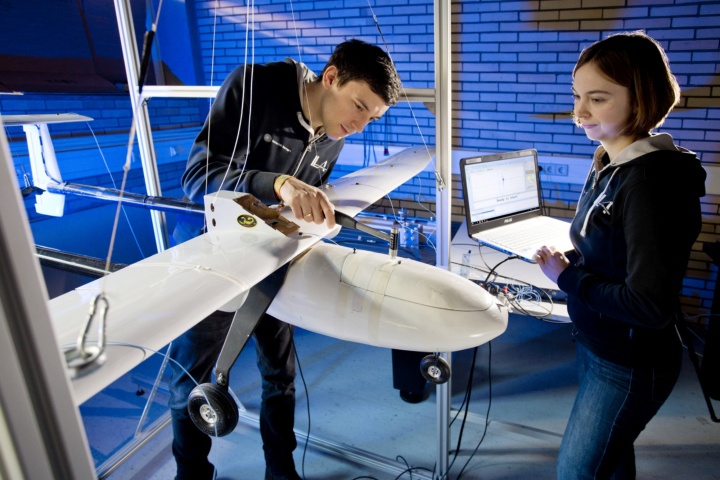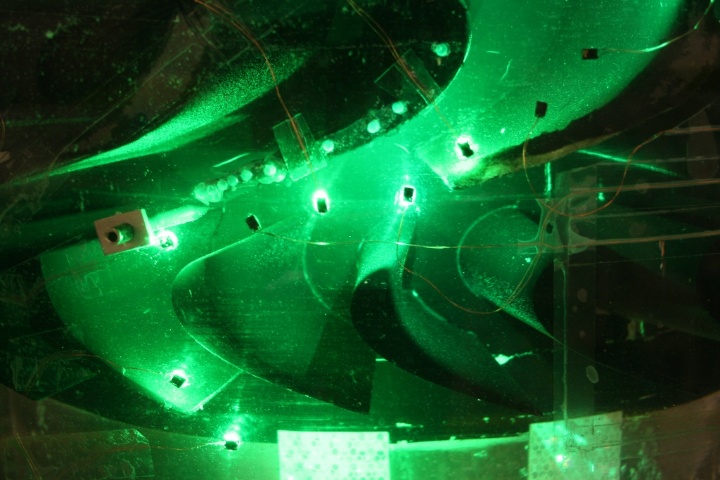High tech comes into play when we carry out trial runs on devices and prototypes. Take our altitude test stand, for example, which is unique in Germany. The test installation lets us expose turbo engines to the environmental conditions prevailing at high flight altitudes without having to flight test them. Sensors and our high-performance computers capture an exact picture of what is happening inside the engines.
Our other installations round out the research: With the low Mach number turbine test stand, for example, we contribute to advances in turbine technology through basic research and measurements in the low Mach number realm. In our fluid mechanics laboratory, we analyze the fluid behavior and flow effects to assess their effects on engines and turbines.
In the vibration laboratory, we characterize the dynamical behavior (as natural frequencies, damping properties, vibrational deflection shapes) of parts and components, where a focus is placed on the influence of nonlinear interactions such as friction in joints and impacts.
Altitude test stand
History
Within the rebuilding of aeronautical research at Technical University of Stuttgart the Institute of Aerospace Propulsion Systems including its Altitude Test Facility (ATF) was established on the university campus Vaihingen from 1960 to 1964. The test facility was designed for engines up to 70kg/s sea level static massflow. Modification, enlargement and performance improvement (also engine with afterburner) of the test facility was carried out in the years 1981 till 1982 and 1985 till 1987.
References
A multitude of test types were carried out at ATF. For example there are the engines J79, PW300, EJ200, RB199 and the core engine BR700 Core. Also turbines like PW 2037 LP, PW 300 LP or GP7000 LP and combustors BR700, Trent XWB and Alecsys Learn burn were tested. Furthermore complex individual projects like the test of compound engine of high-altitude aircraft STRATO 2C or CLEAN (Component VaLidator for Environmentallyfriendly Aero-ENgine), which was supported by the European Union, were performed. Besides engines and their components also tests with piston engines as they are produced by RED-Aircraft or BRP are possible. For the reason of being partner of Rolls Royce in combustor testing as well as MTU Aero Engines and ANECOM Aerotest in turbine testing also tests of next generation components are part of ATF’s multitude test programme.
Technical data
For setting the operating conditions a number of compressors, air heaters and coolers are available. It is possible to interconnect these subsystems in different ways, so that they enable inlet pressures higher and below 1bar, inlet temperatures higher and below 0°C und different altitude pressures or air mass flows.
So a high range of flight conditions like high speed tests up to Mach 2,2 at sea level or relight tests in high altitude up to 21000m can be simulated.
| General Outline: | |
| Installed electrical power | 38MW |
| Cooling water storage | 8000m3 |
| Air dehumidification | At least 250K (dew point) |
| Special technology | Color injection for turbine testing, water injection into fuel, five hole probes |
| Test section 1 (for tests with combustion): | |
| Inlet pressure pi | 5kPa < pi < 240kPa |
| Inlet temperature Ti | 210 < Ti < 430K |
| Maximum air mass flow | 130kg/s |
| Minimum altitude pressure | 5kPa |
| Test cell 1 | Diameter: 3,6m; Length: 8m |
| Maximum exhaust gas temperature | 2200K |
| Test section 2 (for tests without combustion): | |
| Inlet pressure pi | 5kPa < pi < 195kPa (5kPa < pi < 220kPa in 2020) |
| Inlet temperature Ti | 210 < Ti < 430K (210 < Ti < 620K in 2020) |
| Maximum air mass flow | 130kg/s |
| Minimum altitude pressure | 5kPa |
| Test cell 2 | Diameter: 3m, Length: 6m (Update in the end of 2019) |
| Fuel conditioning system: | |
| Fuel storage | 3 x 25m3 |
| Fuel temperature Tfuel | 230K < TKS < 390K |
| Special fuel tank | 1m3 |
FoTeKo (Modification and enlargement from 2017 till 2019)
Form the years 2017 till 2019 project “FoTeKo” (Advanced Technology and Test concepts for Turbines, Combustors and Core Engines), which is supported by the German Federal Ministry for Economic Affairs and Technology and the Ministry for Science, Research and the Arts of the State of Baden-Wuerttemberg, is carried out. As part of FoTeKo a new air heater, which is able to generate inlet temperaures up to 620K at test section 2, is integrated into ATF. To integrate these air heater and to improve the aerodynamic conditions, test section 2 is to be renewed. To increase the total compressor pressure ratio, one of the compressors used at ATF will be extended by an aftercooler. Also the control system is modificated and renewed. For improving the combustor testing ability, new exhaust casings were developed, test cell 1 was extended by a bypass for shorter cooling times and isolated fuel pipes.
In the Institute of Aeronautical Propulsion System’s fluid mechanics laboratory, we carry out flow analyses in nozzles, turbo machine lattices and other air system elements. With the aid of screw compressors, we can provide a maximum air mass flow of approximately 0.84 kg/sec. with excess pressure of 7 bar. Diverse measurement techniques permit detailed capture of flow processes.
Micro gasturbines are used in the area of small power stations or for the propulsion of unmanned aerial vehicles. The institute has a long history in the research and development of micro gasturbines. They have a similar behavior like big turbo engines but are much cheaper in production and in service. We have the ability to investigate micro gasturbine either in thrust configuration or as shaft power variants. The test bed can handle shaft powers up to 10 kW and thrusts up to 300 N. Therefore we have a data acquisition system with 50 temperature and 148 pressure channels.
Our vibration laboratory has a modern equipment (modal analysis hard- and software, vibration isolation tables, shakers, laser vibrometry, force and acceleration sensors, dSpace system). Besides engine blades, we investigate also generic structures as part of our fundamental research. Here, nonlinear interactions such as friction and impacts are playing a central role, which are used for friction damping of engine blades and novel concepts for vibration mitigation. The experimental investigations serve, in particular, for the verification of the developed simulation methods and the identification of characteristic features that currently can only be determined empirically.
Horizontal and vertical flow water channel at the Institute of Aircraft Propulsion Systems
The Institute operates a flat-bed water channel and a vertical water channel as experimental complements to our own fluid mechanics calculations. The channels have already been used to very intensively investigate secondary flow effects. Visualizing the flow phenomena, particularly in the near-wall area, allows, for example, substantively checking results that were achieved purely mathematically. In addition to flows in turbomachines, flow processes in combustion chambers and nozzles are also investigated.
.
Certifications
Target customers and services:
- Enterprises, research institutes, and government agencies
- Cooperative services: theoretical and experimental analyses of turbo engines, aeronautical propulsion systems, and general structural dynamics problems
- Commissioned trial runs on the altitude test stand
- Developing modern computation methods applicable to structural dynamics, fluid mechanics and thermodynamic process analyses
Contact

Christian Koch
Dr.-Ing.Manager Altitude Test Facility, Academic advisor, deputy head of the institute


